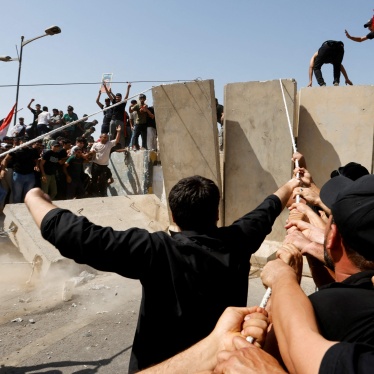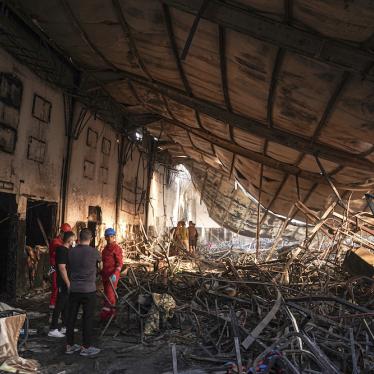(Beirut) – An Iranian ballistic missile attack struck a home in Erbil, in the Kurdistan region of Iraq, on January 15, 2024, killing four civilians and injuring six others, Human Rights Watch said today. Hours later, At 5:05 a.m. on January 16, missile defense systems intercepted three drones fired by the Islamic Resistance in Iraq targeting the Erbil International Airport area, which houses US and Iraqi military forces, resulting in the temporary suspension of air traffic.
Iran’s Islamic Revolutionary Guard Corps claimed responsibility for the attack on the house, saying the attacks targeted a “Mossad espionage center,” a reference to Israel’s intelligence agency. The Kurdistan Regional Government categorically rejected the claim that Israeli intelligence services were operating in the Kurdistan Region of Iraq, saying that the strike was “an excuse to attack Erbil” in clear violation of Kurdistan Region and Iraqi sovereignty.
“Regardless of Iranian claims about the attack, these killings follow a long history of Revolutionary Guard assassinations in residential areas of the Kurdistan Region of Iraq that have targeted civilians” said Sarah Sanbar, Iraq researcher at Human Rights Watch. “Impunity for Iran’s killings of civilians will only embolden more unlawful attacks in the future.”
The attack claimed the lives of two local businessmen, Peshraw Dizayee and Karam Mikhail; Dizayee’s daughter, who was 10 days away from her first birthday; and Dizayee’s housekeeper. Six others, including Dizayee’s wife and two sons, were injured, according to a statement from the Kurdistan Region Security Council.
Naser Tahseen Noori, 31, who lives a few kilometers from Dizayee’s residence, told Human Rights Watch he was going to bed when he heard the explosions. “I heard the first bomb at 11:30 p.m. It was so loud I thought somebody attacked my house and broke the door. Then I got up and went out to check what was going on, and I heard the second and third bombs. The house was shaking,” he said.
Noori said the explosions were followed by heavy gunfire. “I don’t know who was shooting, but it came from two directions. My son is only 11 months old, and he was so scared.”
Drone footage released by Rudaw News following the attack shows near total destruction of Dizayee’s home, and minor damage to neighboring buildings.
In response to the attack, the Iraqi Foreign Ministry recalled its ambassador to Tehran and announced the government’s “commitment to pursuing justice by taking all necessary legal actions, including filing a formal complaint with the UN Security Council.” Prime Minister Mohammed Shia al-Sudani formed a committee to investigate the attack, promising to publish its findings to “dispel any falsehoods propagated by the parties responsible for these reprehensible actions,” an apparent reference to Iran’s claims that Dizayee was engaged in espionage for Israel.
Qassim Al Araji, Iraq’s national security adviser, said the inspections of Dizayee’s home found no evidence of its use as a Mossad headquarters. Iraq should publish the full findings of its investigation.
Masrour Barzani, prime minister of the Kurdistan Region of Iraq, called the attack “cowardly,” and urged the federal government in Baghdad to “take a principled position against the flagrant violation of Iraq’s and the Kurdistan Region’s sovereignty.”
The United States condemned the acts as “reckless and imprecise” and the United Kingdom called them “an unacceptable violation of Iraq’s sovereignty and territorial integrity.” Though Dizayee’s residence was in the vicinity of the new US consulate, currently under construction, the US stated that its personnel and facilities were not targeted or affected.
The Islamic Resistance in Iraq, a coalition of Iraqi militias with links to Iran, has claimed responsibility for over 130 attacks on US military bases in Iraq and Syria since October 17 that it says were conducted in retaliation for US support for Israel in its war in Gaza. A military base hosting international troops near Erbil’s airport and Harir airbase, about 50 kilometers away, have been frequent targets of these attacks.
The Islamic Revolutionary Guard Corps has carried out multiple attacks and targeted assassinations in the Kurdistan region in recent years. In March 2022, Iranian ballistic missiles hit the home of a Kurdish businessman, Baz Karim Barzanji. In September 2022, attacks on Iranian opposition party offices killed at least 16 people, injured dozens more, and displaced hundreds of families. The Islamic Revolutionary Guard Corps also claimed responsibility for attacks on targets linked to the Islamic State in northern Syria on January 15, 2024.
“Iraq should not become an arena for foreign competition at the expense of civilians’ lives and the country’s stability,” Sanbar said “Doing so only increases the risk of regional escalation, destruction, and killings.”







